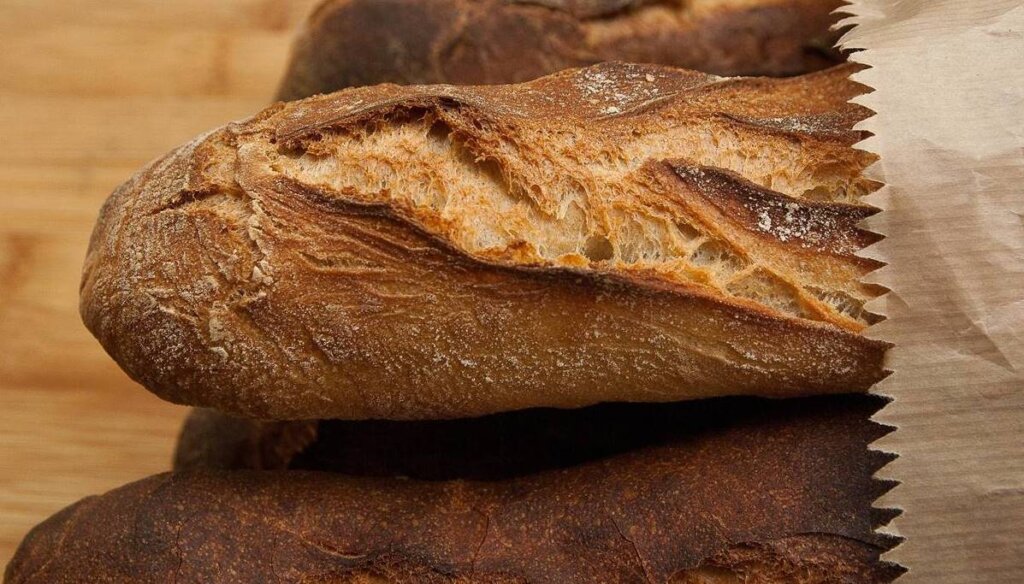Why We Crave Crunchy Foods


Written and verified by the psychologist Valeria Sabater
Potato chips. Spring rolls. Chocolate-covered ice cream bars. Freshly baked bread… Who doesn’t like crispy food? Indeed, it’s extremely rare to find someone who’s uncomfortable with the sensation of crunchy food exploding on their tongue. The reason for this is provided by the fascinating world of neuroscience.
This phenomenon is called “the music of mastication” and is an extremely important auditory sensation for humans. The reason for this is really simple. It offers us information about the state of the food we’re eating. Take, for example, the experience of biting into an apple that’s soft and mushy. You’ll most likely feel revulsion and throw it away.
However, when food is crunchy, our brains interpret it as appetizing and healthy. Indeed, the mushy apple that made no sound when you bit into it was most likely overripe and possibly even rotten.
Although the sound doesn’t provide any nutritional benefit, it’s a stimulus to encourage you to eat.

Crunchy foods, a temptation that’s not always healthy
Great chefs know that sound is important in the world of food. Firstly, you consume a product with your eyes, then with your nose, and finally with your tongue. In addition, the sound, more specifically a crunchy sound, is completely captivating.
In the marketing field, it’s a well-known fact that food packaging is paramount. Just think of the way potato chip lovers enjoy breaking open the crinkly bags of this type of snack. Think of when you buy a loaf of bread. The first thing you do is squeeze it to feel its crunchiness. That’s how you work out how fresh it is and whether it’s worthwhile eating.
Charles Spence is an experimental psychologist at the University of Oxford. He’s spent years researching the neuroscience of eating. In 2015, he conducted a study that claimed any tasty and crunchy product is processed by the brain as healthy. It’s true that this criterion isn’t always met, but it seems it’s an instinct that we can’t resist.
“Cooking is probably the most multi-sensual art. I try to stimulate all the senses.”
-Ferran Adria-
For stress, eat crunchy foods
Ball State University (USA) conducted research that claims when people are stressed, they demonstrate rather specific food needs. In fact, they look for crispy products. They also crave the sweet and salty. It seems that these foods are comforting for the brain, boost the production of serotonin, and have a calming effect.
Therefore, it’s not only our neurological mechanisms that convince us that crunchy foods are apparently healthier. In addition, the experience of eating a potato chip or a cracker is relaxing and gives us a feeling of well-being that’s intense enough to reduce stress.
Many crunchy products contain fat (and our brains love it)
As we’ve already mentioned, somehow, our brains assume that everything crunchy is healthy, good, and worth eating. Certainly, fruit and vegetables (understood to be healthy) when they’re at optimal freshness are bursting with crunchiness.
However, there are also unhealthy, high-fat foods that provide us with the music of mastication. This is explained by the fact that the brain has a special predilection for foods rich in fat, salt, and sugar. In fact, it likes it so much that it rewards us with the release of dopamine, endorphins, and serotonin.

The flavor stays longer in the mouth (and is more enjoyable)
There’s another fascinating fact that explains why we have a predilection for crunchy foods. It’s that any product that we crunch requires more chewing and, therefore, spends more time in our mouths. The delight, we experience, therefore, is more intense.
For example, it’s not the same to eat soup as a crispy cheese pizza. The latter requires more time to consume and the enjoyment stretches almost as much as the mozzarella itself.
Likewise, the big brands of potato chips use the most suggestive seasonings in their products to intensify chewing time. Each of these potato snacks has the most intense flavors (barbecue, paprika, cheese, ham, etc.). Hence, eating this type of product becomes a multisensory experience.
We not only love opening the bags and inhaling their delicious smell. As a rule, we revel in their flavor far more when we feel the burst of each crunch on our tongues. Indeed, the symphony of sensations is highly addictive; so much so that we rarely start a packet without finishing it.
Potato chips. Spring rolls. Chocolate-covered ice cream bars. Freshly baked bread… Who doesn’t like crispy food? Indeed, it’s extremely rare to find someone who’s uncomfortable with the sensation of crunchy food exploding on their tongue. The reason for this is provided by the fascinating world of neuroscience.
This phenomenon is called “the music of mastication” and is an extremely important auditory sensation for humans. The reason for this is really simple. It offers us information about the state of the food we’re eating. Take, for example, the experience of biting into an apple that’s soft and mushy. You’ll most likely feel revulsion and throw it away.
However, when food is crunchy, our brains interpret it as appetizing and healthy. Indeed, the mushy apple that made no sound when you bit into it was most likely overripe and possibly even rotten.
Although the sound doesn’t provide any nutritional benefit, it’s a stimulus to encourage you to eat.

Crunchy foods, a temptation that’s not always healthy
Great chefs know that sound is important in the world of food. Firstly, you consume a product with your eyes, then with your nose, and finally with your tongue. In addition, the sound, more specifically a crunchy sound, is completely captivating.
In the marketing field, it’s a well-known fact that food packaging is paramount. Just think of the way potato chip lovers enjoy breaking open the crinkly bags of this type of snack. Think of when you buy a loaf of bread. The first thing you do is squeeze it to feel its crunchiness. That’s how you work out how fresh it is and whether it’s worthwhile eating.
Charles Spence is an experimental psychologist at the University of Oxford. He’s spent years researching the neuroscience of eating. In 2015, he conducted a study that claimed any tasty and crunchy product is processed by the brain as healthy. It’s true that this criterion isn’t always met, but it seems it’s an instinct that we can’t resist.
“Cooking is probably the most multi-sensual art. I try to stimulate all the senses.”
-Ferran Adria-
For stress, eat crunchy foods
Ball State University (USA) conducted research that claims when people are stressed, they demonstrate rather specific food needs. In fact, they look for crispy products. They also crave the sweet and salty. It seems that these foods are comforting for the brain, boost the production of serotonin, and have a calming effect.
Therefore, it’s not only our neurological mechanisms that convince us that crunchy foods are apparently healthier. In addition, the experience of eating a potato chip or a cracker is relaxing and gives us a feeling of well-being that’s intense enough to reduce stress.
Many crunchy products contain fat (and our brains love it)
As we’ve already mentioned, somehow, our brains assume that everything crunchy is healthy, good, and worth eating. Certainly, fruit and vegetables (understood to be healthy) when they’re at optimal freshness are bursting with crunchiness.
However, there are also unhealthy, high-fat foods that provide us with the music of mastication. This is explained by the fact that the brain has a special predilection for foods rich in fat, salt, and sugar. In fact, it likes it so much that it rewards us with the release of dopamine, endorphins, and serotonin.

The flavor stays longer in the mouth (and is more enjoyable)
There’s another fascinating fact that explains why we have a predilection for crunchy foods. It’s that any product that we crunch requires more chewing and, therefore, spends more time in our mouths. The delight, we experience, therefore, is more intense.
For example, it’s not the same to eat soup as a crispy cheese pizza. The latter requires more time to consume and the enjoyment stretches almost as much as the mozzarella itself.
Likewise, the big brands of potato chips use the most suggestive seasonings in their products to intensify chewing time. Each of these potato snacks has the most intense flavors (barbecue, paprika, cheese, ham, etc.). Hence, eating this type of product becomes a multisensory experience.
We not only love opening the bags and inhaling their delicious smell. As a rule, we revel in their flavor far more when we feel the burst of each crunch on our tongues. Indeed, the symphony of sensations is highly addictive; so much so that we rarely start a packet without finishing it.
All cited sources were thoroughly reviewed by our team to ensure their quality, reliability, currency, and validity. The bibliography of this article was considered reliable and of academic or scientific accuracy.
- Spence, C. Eating with our ears: assessing the importance of the sounds of consumption on our perception and enjoyment of multisensory flavour experiences. Flavour 4, 3 (2015). https://doi.org/10.1186/2044-7248-4-3
- van Bloemendaal L, Veltman DJ, ten Kulve JS, Drent ML, Barkhof F, Diamant M, IJzerman RG. Emotional eating is associated with increased brain responses to food-cues and reduced sensitivity to GLP-1 receptor activation. Obesity (Silver Spring). 2015 Oct;23(10):2075-82. doi: 10.1002/oby.21200. Epub 2015 Aug 31. PMID: 26331843.
- Ventriglio, A., Sancassiani, F., Contu, M. P., Latorre, M., Di Slavatore, M., Fornaro, M., & Bhugra, D. (2020). Mediterranean Diet and its Benefits on Health and Mental Health: A Literature Review. Clinical practice and epidemiology in mental health : CP & EMH, 16(Suppl-1), 156–164. https://doi.org/10.2174/1745017902016010156
This text is provided for informational purposes only and does not replace consultation with a professional. If in doubt, consult your specialist.







